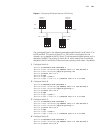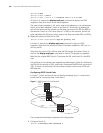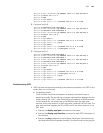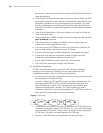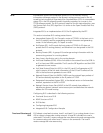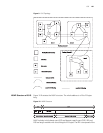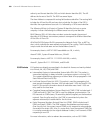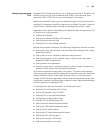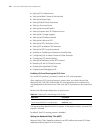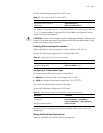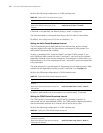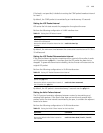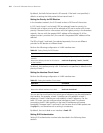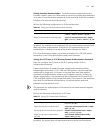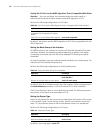IS-IS 109
Configuring Integrated
IS-IS
Integrated IS-IS is designed to function as a routing protocol for IP. Therefore, the
network must be set up with IP addresses and VLANs in the same way that is
required for RIP or OSPF. This set up is not discussed in this section.
Beyond the standard IP setup, you must decide what type of routing hierarchy to
implement. For example, should all routers be set up as level-2 or level-1 routers or
should a level- 2 backbone be constructed connecting various level-1 areas?
Regardless of your decision, the following configuration tasks are required for IS-IS
to function as a routing protocol:
■ Enabling IS-IS globally
■ Setting up the desired VLANs and IP interfaces
■ Setting the network entity title
■ Enabling IS-IS on the required interfaces
Beyond these required commands, the following configuration tasks are common:
■ Setting the router type and level, and the interface level based on the routing
hierarchy you select
■ Setting the cost of an interface to optimize routing decisions
■ Setting authentication at the interface, area, or domain level using simple
password or MD5 authentication
■ Setting default route generation
■ Importing routes from, or exporting routes to, other protocols. To export to a
protocol, see the section that discusses that protocol.
All of these commands are discussed in this section. This section also describes
other commands that are used less frequently. For example, most users should not
change the default values of the various protocol timers, nor do they need to
change the SPF calculation parameters. Other commands described may be used
under specific network conditions (large number of routes, highly meshed designs)
to either optimize or troubleshoot IS-IS.
IS-IS configuration tasks are discussed in the following sections:
■ Enabling IS-IS and Entering the IS-IS View
■ Setting the Network Entity Title (NET)
■ Enabling IS-IS on the Specified Interface
■ Configuring IS-IS Route Metric Type
■ Setting IS-IS Link State Routing Cost
■ Setting the Hello Packet Broadcast Interval
■ Setting the CSNP Packet Broadcast Interval
■ Setting the LSP Packet Interval
■ Setting the LSP Packet Retransmission Interval
■ Setting the Hello Failure Interval
■ Setting the Priority for DIS Election
■ Setting the Interface Circuit Level



